‘How are you supposed to enjoy music by somebody that hates you?’: Jewish fans press pause on Ye’s songs
For many Jews, it’s become impossible to separate the art from the artist
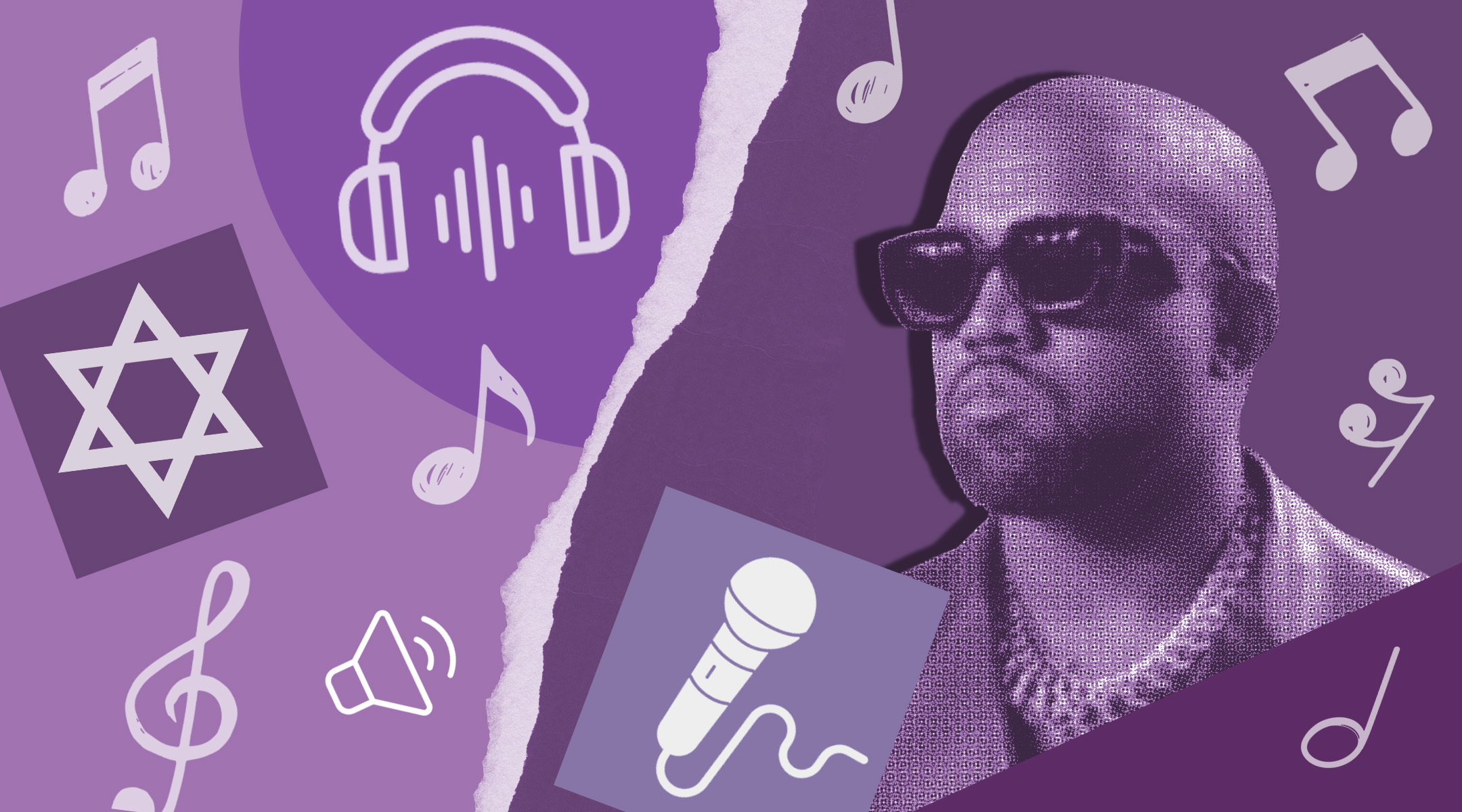
(Rich Fury/VF20/Getty Images for Vanity Fair/ Design by Mollie Suss)
(JTA) — Simon Vozick-Levinson has followed Ye, the artist formerly known as Kanye West, for his entire career. He became a fan after hearing the rapper’s first mixtape around 2002, then played his debut album, “The College Dropout,” on repeat after its 2004 release. He said he appreciated Ye’s “honest, nuanced, sensitive” lyrics and his “original ear” as a producer.
After college, Vozick-Levinson went into music journalism and interviewed the rapper-producer more than once. In 2010, he ranked Ye’s “My Beautiful Dark Twisted Fantasy” as the year’s best album in a Village Voice critics poll. In recent years, though, he felt the rapper’s erratic behavior and provocative statements had started to overshadow his musical accomplishments. And after two weeks of antisemitic rants by Ye on a multitude of platforms — including a tweet in which he threatened to go “death con 3” on Jewish people — the journalist said he can no longer stomach Ye’s music.
“I’m not ready to make a blanket statement that I’m never going to enjoy listening to Kanye’s music again,” Vozick-Levinson, the deputy music editor at Rolling Stone magazine, told the Jewish Telegraphic Agency. “It’s music that’s important to me, music that I love. But right now, I would find it pretty nauseating to listen to a Kanye record.”
He added, “How are you supposed to enjoy music by somebody that hates you?”
Vozick-Levinson, 38, is among scores of Jewish fans of Ye’s who have been repulsed by his unabashed and relentless antisemitism. Some are struggling to separate the art from the artist as they figure out how, or even if, they can continue to consume the music and fashion he has created. Others say they don’t feel conflicted at all.
Erez Safar, a music producer and author based in Los Angeles whose own work often centers on Jewish themes, described himself as a “massive” fan of the rapper before this month. Now, he said, “I don’t really want to hear his voice anymore because I just associate him with spewing hate.”
Safar, who has worked with audio engineers who also worked with Ye, said he had thought the rapper was “starting to find the light” when he launched his pop-up church, Sunday Service, and released a gospel album, “Jesus Is King,” in 2019. But since then, Safar said, he has exuded negativity, including at an event Safar attended for the “Donda 2” album in Miami earlier this year.
“The whole thing was darkness,” Safar said, noting that Ye and other performers wore black hoods while a church that was part of the set was deliberately set on fire. “I wish I hadn’t gone.”
Safar called the revelation made by CNN on Thursday that, according to former associates of his, Ye has long admired Hitler and wanted to name one of his albums after the Nazi leader “deeply disturbing on many levels.”
While many Jews are pressing pause on Ye’s music, others are responding in creative ways. Kosha Dillz, the Jewish rapper based in New York, hit back at Ye in true hip hop form; he wrote a diss — a personal attack against a rival rapper set to music — and filmed a video in Crown Heights that is racking up views on YouTube. Dan Rosen of the comedy duo Cannibal Milkshake made a TikTok in which he proposed a workaround that would allow Jews to listen to Ye’s songs without feeling guilty: by watching “Schindler’s List” at the same time.
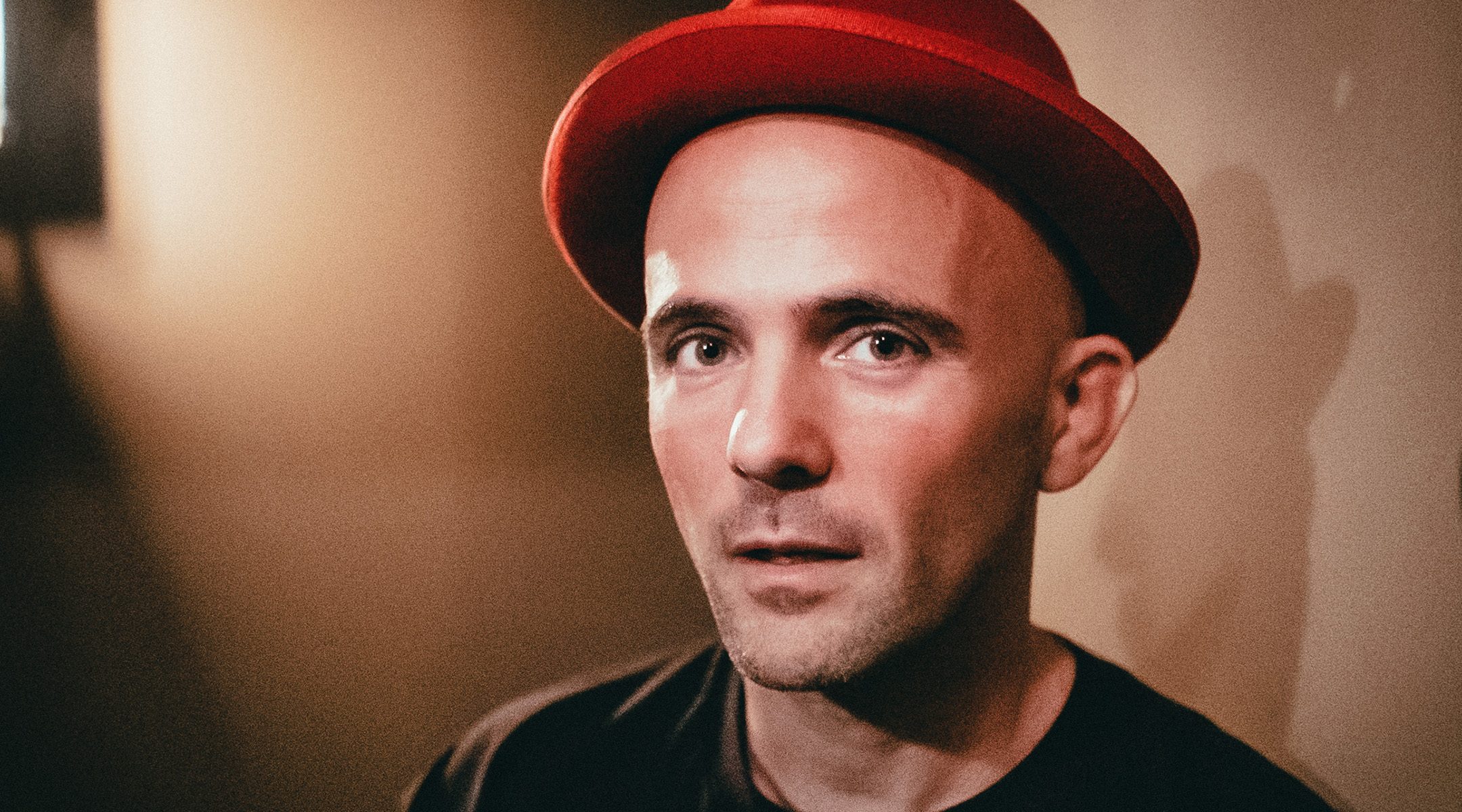
Kosha Dillz wrote a Ye “diss” track and filmed a video in Crown Heights that is racking up views. (Courtesy)
Meanwhile, for Black Jews, many of whom were turned off by earlier offensive statements Ye made about slavery and by his support for former President Donald Trump, the episode has proved especially tricky to navigate.
“Every time you follow an artist, it’s disheartening when they disappoint you,” said Raven Schwam-Curtis, a doctoral student in African American Studies at Northwestern University and a TikTok creator. “From the perspective of being a Black Jew, this is a really painful moment because it illuminates the many tensions that exist between the Black community and the Jewish community. It breaks my heart to see the people that I love being in such a contentious place.”
Schwam-Curtis has addressed the firestorm over Ye’s remarks on their TikTok channel and Instagram account, where they have a combined 91,000 followers. They said some commenters have tried to defend the rapper, pointing to the fact that he has bipolar disorder, or to downplay the situation. A few have left antisemitic comments, including one accusing Jews of making others hate them due to their “predatory business practices and media scheming.”
“This is not just a conversation on the internet,” Schwam-Curtis said in a TikTok posted on Tuesday night. “This impacts how we move through the world.” They included a screenshot of a tweet about an antisemitic group that made Nazi salutes and displayed a banner over a Los Angeles freeway reading, “Kanye Is Right About The Jews.”
Born in New York City, Schwam-Curtis, 24, grew up in Houston and said they had many fond memories of listening to Ye’s music in middle school. During the interview with JTA, they began singing the chorus of “Stronger,” one of Ye’s biggest hits. But they said they reached a “tipping point” with the artist in 2016, when he allied himself with Trump and donned a red “Make America Great Again” hat.
His recent descent into anti-Jewish bigotry does not come as a shock, Schwam-Curtis said. “This antisemitic idea that Jews control everything, that’s an idea that I’ve heard circulated in Black communities that I’ve been a part of in the past, so that wasn’t surprising to me,” they said. “He’s said many anti-Black things [too], but because he’s a Black man, I don’t think people knew what to do with that. He’s gotten away with a lot, and I’m just grateful that this is a moment of reckoning in which people are holding him accountable for all of it.”
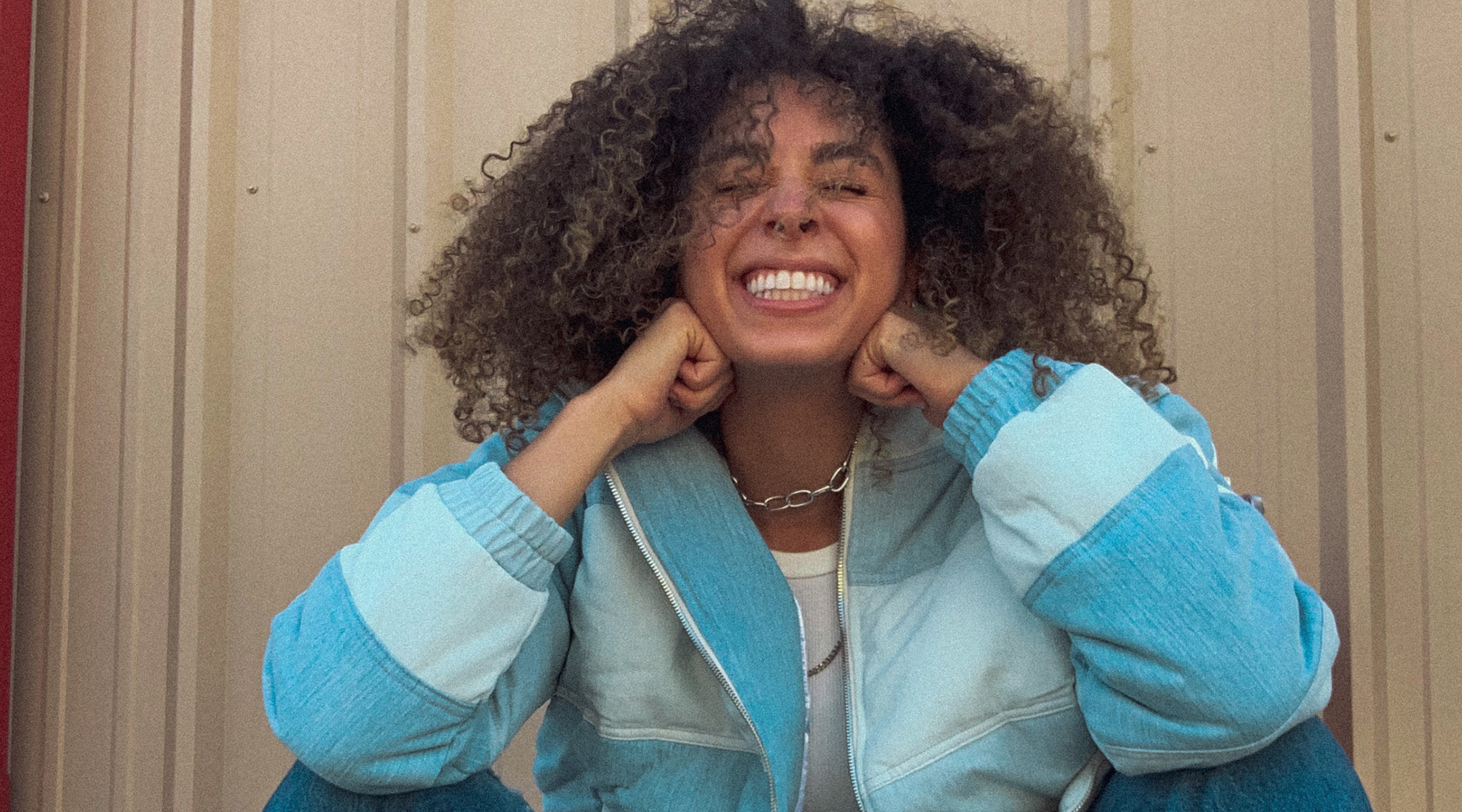
Raven Schwam-Curtis, a doctoral student at Northwestern University, has addressed the firestorm over Ye’s remarks on their TikTok channel and Instagram account. (Courtesy)
On Tuesday, Adidas announced it would end its business relationship with Ye after mounting public pressure to do so. Since 2015, the company has manufactured Yeezy shoes and clothing, a product line that reportedly generated $2 billion in sales per year. As a result, Ye lost his billionaire status, according to Forbes. Other companies that severed ties with Ye this month include Balenciaga, Gap, Foot Locker, T.J. Maxx, and the talent agency CAA.
Ari Emanuel, the Jewish chief executive of entertainment company Endeavor, has called on Spotify and Apple Music to stop streaming Ye’s albums, writing in the Financial Times that “hatred and anti-Semitism should have no place in our society, no matter how much money is at stake.” (Spotify’s CEO, Daniel Ek, condemned Ye’s remarks on Tuesday but said a decision to remove his music from the service could only be made by his former label, Def Jam.) In addition, a Jewish educator who worked at Donda Academy, the private school Ye founded outside Los Angeles, resigned on Oct. 11; the school closed abruptly this week.
While Ye has alienated many Jewish fans (who may be former fans now), he has also lost considerable support among non-Jews. Alex Toussaint, a popular Peloton cycling instructor, announced on Monday that he would not program the rapper’s songs during his classes. “You will not hear that artist in my class at all, I promise y’all,” he said. “I do not support hate speech whatsoever, baby.” Two days later, Peloton released a statement saying that it had “indefinitely paused” Ye’s music across its entire platform.
On the New York hip hop station Hot 97, DJ Peter Rosenberg said he was heartened by the level of support he saw being expressed online for the Jewish community.
“In this specific incident, I have seen more examples of non-Jews standing up against this than I’ve ever seen before and thank you, I appreciate it,” he said. “Black Twitter widely has completely written this off as disgusting, so I see that. It’s not just Jews who are offended by this.” (Black Twitter refers to an informal community of Black users of the social media site.)
During the segment, Rosenberg spoke about how relatives of his were murdered during the Holocaust and that his mother was in a displaced persons camp in Germany. On Instagram, his brother, Nick Rosenberg, shared an image of their Polish great-uncle, Abraham, who was last seen alive in the Lvov ghetto in 1942. The caption read, in part, “I love Ye, and have since the College Dropout bootleg. But what he’s toying with is not a game.”
Perhaps the most famous non-Jew to castiage Ye to date was his own ex-wife, Kim Kardashian, though she did so without naming him. On Monday, she tweeted to her 73.9 million followers, “Hate speech is never OK or excusable. I stand together with the Jewish community and call on the terrible violence and hateful rhetoric towards them to come to an immediate end.”
In a conversation with podcast host Lex Fridman released on Tuesday, Ye acknowledged that he caused pain with his words and apologized to Fridman, who is Jewish, and to “the Jewish people that I’ve hurt.” He also referred to Jews as “my brothers because I classify and feel that I’m also connected with Christ in that way.” (Ye identifies as a Christian and presumably was referring to the fact that Jesus was Jewish.) He continued, “I feel that there’s an important — the sons of Abraham, however we want to word it — for us to come together and bring our talents together to serve God collectively.”
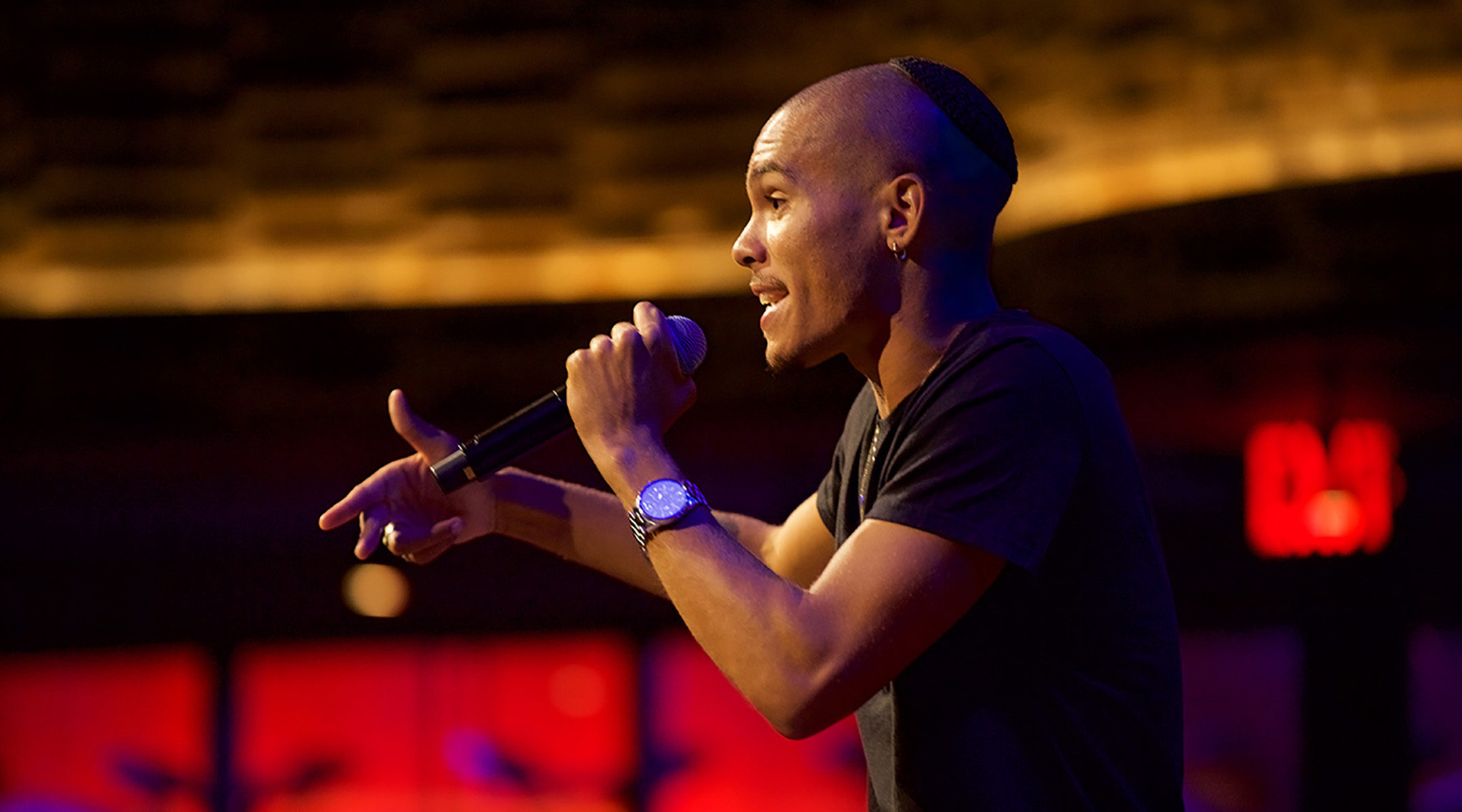
Noah Shufutinsky, aka Westside Gravy, performing at Jewish National Fund-USA’s Spectacular Sunday on Sept. 12, 2021. (Bindelglass Photography)
Yitz Jordan, the Black and Jewish rapper better known as Y-Love, told JTA he found the apology to be totally inadequate, as Ye repeated several antisemitic tropes on the podcast.
“If you follow that up by saying that Jews run the media, and that Jews should see you as Jewish, it cancels out any positive sentiment that could have even been there,” Jordan said.
On Twitter and subsequently on an episode of the “Drink Champs” podcast earlier this month, Ye expressed his belief that Black people are actually Jews who descend from the lost tribes of Israel. Jordan said he finds this idea, which originated in the late 19th century and is a tenet of the Black Hebrew Israelite spiritual movement, offensive and inconsistent with Ye’s professed Christian faith. He also argued that much of Ye’s commentary about Jews actually reveals a “conflation of Jewish and white” in his mind.
“I would want to remind him that anything he’s saying about Jews, he’s saying about Black people,” Jordan said. “Where’s this line that you think exists that you can talk about Jews and not be pointing the fingers at potentially some of your own relatives?”
A veteran rapper who is known for spitting bars in Hebrew, Yiddish, Aramaic and English, Jordan said Ye’s music was part of the soundtrack to his life in the late 2000s. Now? “His brand is toxic, his brand is trash,” the Columbus, Ohio, resident said. “There’s nothing I would want to do with it.”
Asked if he thinks it will be possible for Ye to do teshuvah, a Jewish process of repentance, and get back into the good graces of Jewish fans, Jordan replied, “He’s really negatively affected a lot of peoples’ lives at this point, so teshuvah is going to be a multi-step process. It’s not going to be easy. But the first person he has to do teshuvah with is himself, and that means getting the help that he needs.”
In Israel, where Ye has performed in the past, the rapper’s meltdown has been a topic of conversation in the media — though with another national election just days away, Ye is likely not foremost on Israelis’ minds. Still, on Wednesday, Israeli president Isaac Herzog told CNN he was “extremely pleased, objectively, as an Israeli, as a Jew, as a human being” by the “overwhelming reaction” to the rapper’s remarks.
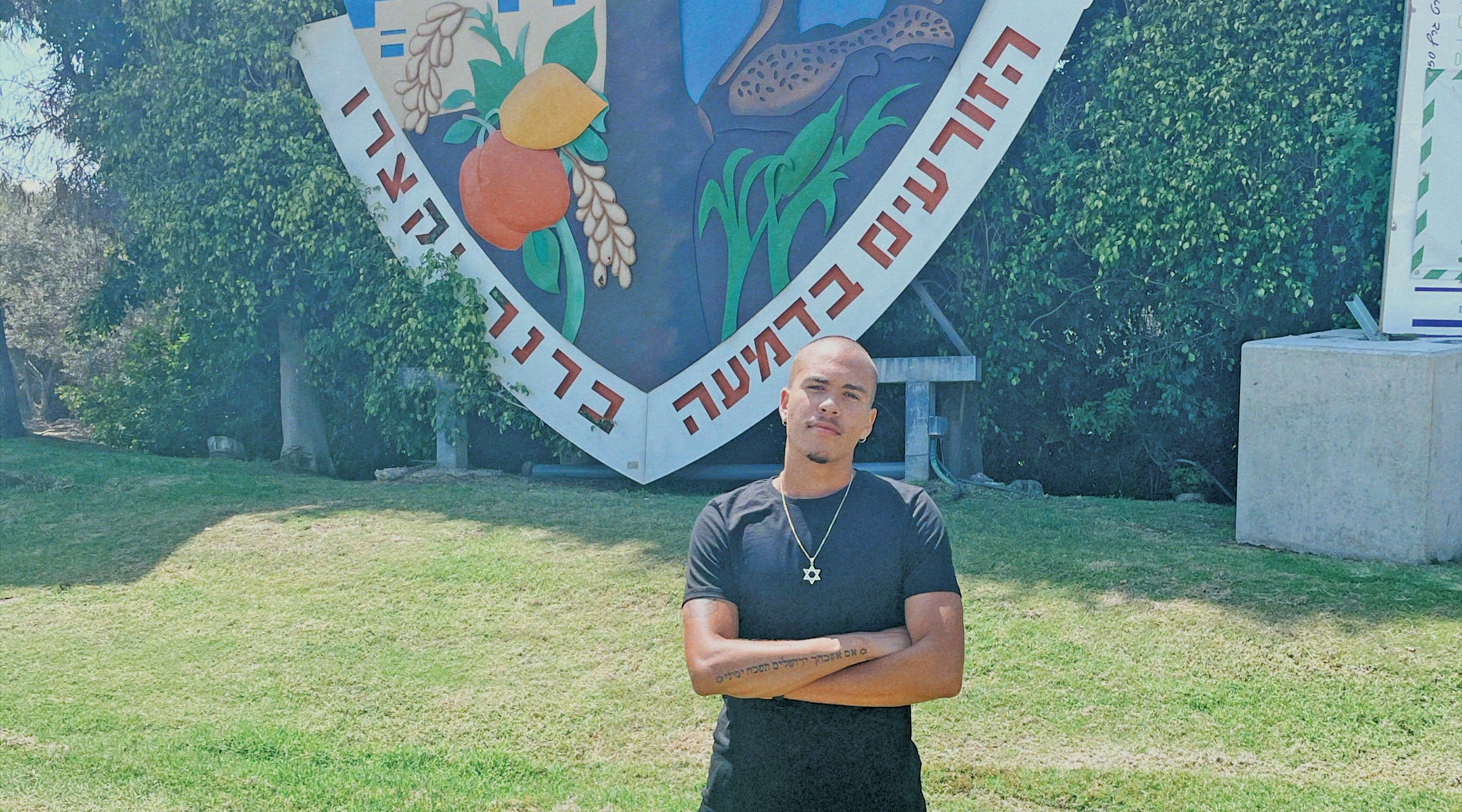
Noah Shufutinsky, aka Westside Gravy, in Hadera, his new home in Israel. (Courtesy)
Noah Shufutinsky is a new Israeli, having made aliyah from the United States in July. A Black and Jewish hip hop artist who works with the Israel education organization StandWithUs, he told JTA he prefers the West Coast rap he listened to growing up in San Diego to Ye’s music. “This falls in line with his pattern of saying crazy, bigoted things,” Shufutinsky said. “It doesn’t change the way I’ve interacted with his art because I never really have.”
Shufutinsky — who performs under the name Westside Gravy — is working on a song that samples West’s comments about Jews. The forthcoming single, “Ben Bayit,” includes a clip of one of Ye’s more bizarre recent statements about how “Jewish Zionists” were responsible for an intimate detail about Kardashian’s life being made public.
“It’s Jewish Zionists that’s about that life,” Ye says in the clip. Shufutinsky, 22, explained that the phrase means “someone is serious about what they’re doing.” He decided to use the clip in the song, which is about his new life in Israel, as a response to Ye. “It’s a way to show that Jewish Zionists are proud of our roots and serious about representing who we are and standing up to hatred,” he said. “It’s important to define ourselves and tell our own story.”
Another Israel-based rapper, Ben Blackwell, expressed more sympathy than most for Ye. Born and raised in the African Hebrew Israelite community in Dimona, Blackwell considers the man to be a genius, albeit one who is going through “a hard time” right now. It’s not Blackwell’s place to judge him, he said.
“He knows how to use his platform and his tongue, and you never know if he’s doing it for attention or that’s just how he feels about the Jewish people he’s encountered in his life,” Blackwell said. “There’s good and bad from every religion, every nationality.”
Blackwell, 29, had a breakout hit with his song “Israel We Go Hard” a decade ago and is putting the finishing touches on his first album. As a Hebrew Israelite, he said he disagrees with Ye’s contention that Black people are the real Jews.
“I would never call myself a Jew because ‘Jew’ comes from the tribe of Judah,” he said. “There were 12 tribes [of Israel], and ain’t no telling which tribe I’m from.” Members of the African Hebrew Israelite community in Israel do identify as descendants of the tribe of Judah, in general, and lead a lifestyle based on the Torah. They are not recognized as Jews according to halacha, or Jewish law.
Instead of canceling Ye, Blackwell said, “we should try to see what the root of his pain is and be helpful towards him.”
(The Anti-Defamation League, in an Oct. 20 blog post, reported that extremist Black Hebrew Israelite groups praised Ye for “spreading their teachings” and “fighting against Jewish control.” The African Hebrew Israelite community to which Blackwell belongs is not connected to such groups.)
Back in the United States, Rami Even-Esh has decided he won’t play Ye’s music for a while. “We live in a time when there are plenty of great artists we can listen to,” he said.
Even-Esh, known to his fans as Kosha Dillz, recalled seeing Ye perform “Jesus Walks” at Rutgers University in New Jersey in the early 2000s when Even-Esh was a student there. He said he never thought he would make a diss record about the rapper. But that’s exactly what he did with “Death Con 3.” The video had 74,000 views as of Thursday afternoon.sxa
“We were trying to get a pair of Yeezys [shoes] and burn them [on camera] because that’s the ultimate sign of disrespect,” he said. “I just couldn’t get a pair in time.”
As a cast member of the improv comedy show “Wild ‘N Out,” Even-Esh works with host Nick Cannon, who weathered an antisemitism scandal of his own in 2020. During a conversation with rapper Professor Griff on his podcast, “Cannon’s Class,” Cannon praised the Nation of Islam’s antisemitic leader, Louis Farrakhan, and promoted conspriacy theories about Jewish wealth and the Rothschild family. He also referred to Black people as the “true Hebrews.” ViacomCBS cut ties with him.
Unlike Ye, Cannon quickly apologized and invited Rabbi Abraham Cooper of the Simon Wiesenthal Center onto his podcast. “Nick is a good dude,” Even-Esh said. “His issues are irrelevant in comparison to the issues that Kanye has.”
He added, “When you think you’re immune from disrespect, you’re gonna get checked. It doesn’t matter how big you are.”
This article originally appeared on JTA.org.















